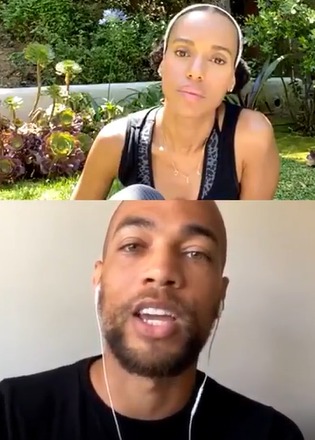“Insecure” actor Kendrick Sampson is one of the many celebrities who’ve joined the protests over the death of George Floyd and police brutality.
He spoke with Kerry Washington about the protests, as well as mental health, on Instagram Live. Sampson also talked about defunding the police, something that activists have been demanding for many years. But the call has increased significantly since the current protests.

Defunding the police would mean shifting city-level budgets that are designated for police and using those funds to improve social services.
Earlier this month, Patrisse Cullors, co-founder of Black Lives Matter, told WBUR Boston’s public radio station, that “Defunding the police means that we are reducing the ability for law enforcement to have resources that harm our communities. It’s about reinvesting those dollars into Black communities, communities that have been deeply divested from.”
Before Sampson spoke about the police, he talked about how he maintains his mental health since he admitted to having trouble sleeping lately.
Sampson joined a protest in Los Angeles on May 30, where police shot him seven times with rubber bullets and hit him with a baton. He recorded himself on Instagram Live while at the protest and gave an on-the-ground report of what he witnessed.
One thing Sampson does to mentally take care of himself is keep in regular contact with his doctors to make sure he’s maintaining his physical health. He also tries to get sun and fresh air whenever possible, eats properly, and attends therapy sessions at least once a week.
Sampson also talked about why mental health services are so crucially needed for Black people.
“Especially for marginalized communities, Black folks, indigenous folks, there is generational trauma,” he said around the 2:31 mark. “There’s trauma that hasn’t ever been addressed, hasn’t ever been culturally competent — trauma-informed mental health-care system or even a system of practices that is cultural and accepted and encouraged in our culture, in our communities — and a lot of the resources that we have, and practices that we have, spiritually were taken from us culturally and so we have never had a point in history where we’ve been able to deal with the trauma of slavery and genocide and such.”
He continued, “And then it went to Jim Crow, and then it went to segregation, and then the prison industrial complex, and policing, which is a continuation of that legacy, of slave catching and slavery under the guise of the 13th Amendment … Our largest mental health career provider is prisons; it’s prisons and jails.”
Sampson co-founded the organization Bld Power, which, according to its website, “engages culture, education and activism to build and train an inclusive community of entertainers and athletes to advance radical social change.”
Toward the end of his talk with Washington, he spoke about defunding the police and using a portion of those funds to improve access to mental health for underserved communities.
“This healing work is so important and integral to our freedom and our liberation, so this is the personal work that needs to be done,” said Sampson. “We’re talking about defunding the police; most of us are talking about moving those resources to mental health resources.”


